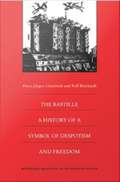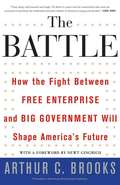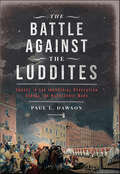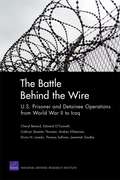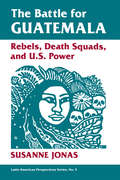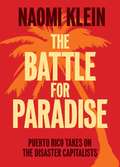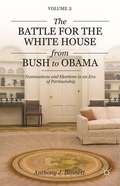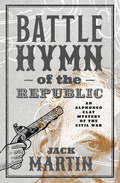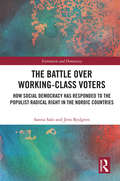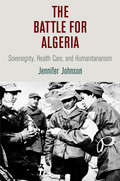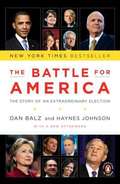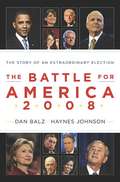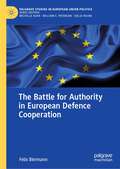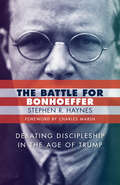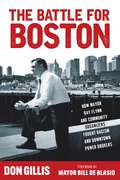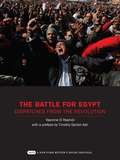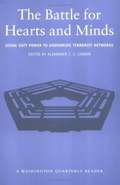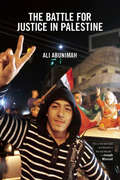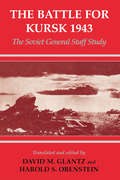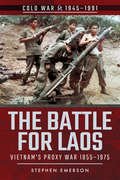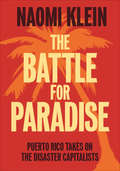- Table View
- List View
The Bastille: A History of a Symbol of Despotism and Freedom
by Hans-Jürgen Lüsebrink Rolf ReichardtThis book is both an analysis of the Bastille as cultural paradigm and a case study on the history of French political culture. It examines in particular the storming and subsequent fall of the Bastille in Paris on July 14, 1789 and how it came to represent the cornerstone of the French Revolution, becoming a symbol of the repression of the Old Regime. Lsebrink and Reichardt use this semiotic reading of the Bastille to reveal how historical symbols are generated; what these symbols' functions are in the collective memory of societies; and how they are used by social, political, and ideological groups. To facilitate the symbolic nature of the investigation, this analysis of the evolving signification of the Bastille moves from the French Revolution to the nineteenth century to contemporary history. The narrative also shifts from France to other cultural arenas, like the modern European colonial sphere, where the overthrow of the Bastille acquired radical new signification in the decolonization period of the 1940s and 1950s. The Bastille demonstrates the potency of the interdisciplinary historical research that has characterized the end of this century, combining quantitative and qualitative approaches, and taking its methodological tools from history, sociology, linguistics, and cultural and literary studies.
The Battle
by Arthur C. BrooksAmerica faces a new culture war. It is not a war about guns, abortions, or gays-rather it is a war against the creeping changes to our entrepreneurial culture, the true bedrock of who we are as a people. The new culture war is a battle between free enterprise and social democracy. Many Americans have forgotten the evils of socialism and the predations of the American Great Society’s welfare state programs. But, as American Enterprise Institute’s president Arthur C. Brooks reveals in The Battle, the forces for social democracy have returned with a vengeance, expanding the power of the state to a breathtaking degree. The Battle offers a plan of action for the defense of free enterprise; it is at once a call to arms and a crucial redefinition of the political and moral gulf that divides Right and Left in America today. The battle is on, and nothing less than the soul of America is at stake.
The Battle
by Arthur C. BrooksAmerica faces a new culture war. It is not a war about guns, abortions, or gays-rather it is a war against the creeping changes to our entrepreneurial culture, the true bedrock of who we are as a people. The new culture war is a battle between free enterprise and social democracy. Many Americans have forgotten the evils of socialism and the predations of the American Great Society’s welfare state programs. But, as American Enterprise Institute’s president Arthur C. Brooks reveals in The Battle, the forces for social democracy have returned with a vengeance, expanding the power of the state to a breathtaking degree. The Battle offers a plan of action for the defense of free enterprise; it is at once a call to arms and a crucial redefinition of the political and moral gulf that divides Right and Left in America today. The battle is on, and nothing less than the soul of America is at stake.
The Battle Against the Luddites: Unrest in the Industrial Revolution During the Napoleonic Wars
by Paul L. DawsonAs the columns of French infantry marched up the slopes of the Mont St Jean at Waterloo, the British heavy cavalry, the Royal Scots Greys to the fore, crashed into the packed ranks of the enemy. This was not the first time the Greys had drawn their swords during the Napoleonic Wars – but it was their first against Napoleon’s troops. Three years earlier they had attacked workers in Halifax protesting at the introduction of machinery in the wool trade. Taking their name from Ned Ludd, who had smashed up knitting frames in Nottingham, the Luddites saw the emergence of mechanization as a threat to their livelihood, with machines replacing men. In response they took matters into their own hands by wrecking the new equipment. Industrial unrest had gathered pace throughout the 18th century and exploded in an unpresented wave of violence in 1799. Outbreaks of machine-breaking developed rapidly into strikes in a battle of capital against labor. A court battle ensued, culminating in new legislation in 1806 that backed the capitalists. This act, coupled with the impact of the Continental system introduced by Napoleon, which closed European and American ports to British merchants, heralded the largest economic depression of the era. Famine, pestilence and rising employment all fueled the fires of Luddism. Months of violence swept across the West Midlands, Lancashire and Yorkshire which saw one factory boss murdered; other factory owners began shooting protesting workers. The disturbances resulted in the mobilizing of thousands of regular soldiers – at one time there were as many British soldiers fighting the Luddites than there were fighting Napoleon on the Iberian Peninsula. As well as exploring these events, Paul L. Dawson also uncovers the origins of Luddism and their allies in the middle classes. The Napoleonic Wars marked the end of centuries old way of life in agriculture, textile production and the wider economy. The dramatic changes in Britain between 1790 and 1815 created a unique set of social grievances by those left behind by the unprecedented changes that were surging through the Britain which exploded into bitter fighting across large swathes of the country. With present day concerns over computerization replacing labor, this is a story that echoes down the centuries.
The Battle Behind the Wire: U. S. Prisoner and Detainee Operations from World War II to Iraq
by Cheryl Benard Edward O'Connell Cathryn Quantic Thurston Andres Villamizar Elvira N. LoredoThis report finds parallels in U.S. prisoner and detainee operations in World War II, Korea, Vietnam, and Iraq: underestimation of the number to be held, hasty scrambling for resources, and inadequate doctrine and policy. Later, attempts to educate and influence prisoners and detainees are often made. The authors recommend that detailed doctrine should be in place prior to detention and that detainees should be interviewed when first detained.
The Battle For Guatemala: Rebels, Death Squads, And U.s. Power
by Susanne JonasA contemporary history of Guatemala's thirty-year civil war,the longest and bloodiest in the hemisphere,this book pulls aside the veil of secrecy that has obscured the origins of the war. Using a structural analysis that takes critical events and changes in the nation's economic and social structure as a starting point for understanding its political crises, the author unravels the contradictions of Guatemalan politics and illustrates why, in the face of unmatched military brutality and repeated U.S. interventions, popular and revolutionary movements have arisen time and again. The central protagonists in the turbulent battle for Guatemala,rebels, death squads, and the United States,are evaluated in a dynamic framework that highlights the role of indigenous peoples and women and underscores the articulation of ethnic and gender divisions with class divisions. This book's interdisciplinary approach differentiates it from others in English and makes it an invaluable case study on the internal dynamics of Third World revolution and counterrevolution as well as on issues of human rights and U.S. policy in Central America.
The Battle For Paradise: Puerto Rico Takes On The Disaster Capitalists
by Naomi Klein"We are in a fight for our lives. Hurricanes Irma and María unmasked the colonialism we face in Puerto Rico, and the inequality it fosters, creating a fierce humanitarian crisis. Now we must find a path forward to equality and sustainability, a path driven by communities, not investors. And this book explains, with careful and unbiased reporting, only the efforts of our community activists can answer the paramount question: What type of society do we want to become and who is Puerto Rico for?"--Carmen Yulín Cruz, Mayor of San Juan <P><P> In the rubble of Hurricane Maria, Puerto Ricans and ultrarich "Puertopians" are locked in a pitched struggle over how to remake the island. In this vital and startling investigation, bestselling author and activist Naomi Klein uncovers how the forces of shock politics and disaster capitalism seek to undermine the nation's radical, resilient vision for a "just recovery." <P><P> All royalties from the sale of this book in English and Spanish go directly to JunteGente, a gathering of Puerto Rican organizations resisting disaster capitalism and advancing a fair and healthy recovery for their island. For more information, visit http://juntegente.org/. <P><P> Naomi Klein is an award-winning journalist, syndicated columnist, documentary filmmaker and author of the international bestsellers No Logo: Taking Aim at the Brand Bullies, The Shock Doctrine: The Rise of Disaster Capitalism, This Changes Everything: Capitalism vs. the Climate, and No Is Not Enough.
The Battle For The White House From Bush To Obama
by Anthony J. BennettAnthony Bennett guides us through the events of the four elections of the 21st century, showing how this era of partisanship has reshaped not only presidential nominations and elections, but the American presidency and politics itself.
The Battle Hymn of the Republic (Alphonso Clay Mysteries of the Civil War)
by Jack MartinThe Civil War has ended—but the killing isn&’t over—in this intriguing historical murder mystery: &“I can&’t wait to read the next Alphonso Clay book.&” —RP Dahlke, author of the Dead Red Mysteries April 1865: The Civil War is all but over after Lee&’s surrender at Appomattox, but there are those who don&’t want the killing to end. Abraham Lincoln&’s assassin is still in hiding—but more violence is planned in a conspiracy to destroy the country once and for all. With the nation and countless civilian lives at stake, Col. Alphonso Clay, a master of intrigue and detection who has served General Grant with honor, is assigned to the case by the secretary of state. With the help of a beautiful agent, he is about to travel into the destructive heart of a secretive cult older than the United States itself . . .
The Battle Over Working-Class Voters: How Social Democracy has Responded to the Populist Radical Right in the Nordic Countries (Extremism and Democracy)
by Jens Rydgren Sanna SaloThis book examines how social democratic parties have responded to populist radical right parties in the battle for support from working-class voters. It focuses on the paradigmatic examples of social democratic parties in the Nordic countries. Historically these have been the strongest social democratic parties, but they have declined in recent years partly due to the competition from populist radical right parties. In addition, since populist radical right parties tend to support liberal and conservative parties in parliament or in governmental negotiations, social democratic parties’ ability to impact broader policy areas has declined as well. The book provides a detailed empirical account of how social democratic parties – and more broadly, labour movement organisations, including unions – have responded to these challenges across Denmark, Sweden, Finland, and Norway. This volume will be of interest to scholars of party politics, comparative politics, Nordic politics, and the populist radical right.
The Battle against Anarchist Terrorism
by Richard Bach JensenThis is the first global history of the secret diplomatic and police campaign that was waged against anarchist terrorism from 1878 to the 1920s. Anarchist terrorism was at that time the dominant form of terrorism and for many continued to be synonymous with terrorism as late as the 1930s. Ranging from Europe and the Americas to the Middle East and Asia, Richard Bach Jensen explores how anarchist terrorism emerged as a global phenomenon during the first great era of economic and social globalization at the end of the nineteenth and beginning of the twentieth centuries and reveals why some nations were so much more successful in combating this new threat than others. He shows how the challenge of dealing with this new form of terrorism led to the fundamental modernization of policing in many countries and also discusses its impact on criminology and international law.
The Battle for Algeria: Sovereignty, Health Care, and Humanitarianism (Pennsylvania Studies in Human Rights)
by Jennifer JohnsonIn The Battle for Algeria Jennifer Johnson reinterprets one of the most violent wars of decolonization: the Algerian War (1954-1962). Johnson argues that the conflict was about who—France or the National Liberation Front (FLN)—would exercise sovereignty of Algeria. <P><P>The fight between the two sides was not simply a military affair; it also involved diverse and competing claims about who was positioned to better care for the Algerian people's health and welfare. Johnson focuses on French and Algerian efforts to engage one another off the physical battlefield and highlights the social dimensions of the FLN's winning strategy, which targeted the local and international arenas. Relying on Algerian sources, which make clear the centrality of health and humanitarianism to the nationalists' war effort, Johnson shows how the FLN leadership constructed national health care institutions that provided critical care for the population and functioned as a protostate. <P><P>Moreover, Johnson demonstrates how the FLN's representatives used postwar rhetoric about rights and national self-determination to legitimize their claims, which led to international recognition of Algerian sovereignty.By examining the local context of the war as well as its international dimensions, Johnson deprovincializes North Africa and proposes a new way to analyze how newly independent countries and nationalist movements engage with the international order. <P><P>The Algerian case exposed the hypocrisy of selectively applying universal discourse and provided a blueprint for claim-making that nonstate actors and anticolonial leaders throughout the Third World emulated. Consequently, The Battle for Algeria explains the FLN's broad appeal and offers new directions for studying nationalism, decolonization, human rights, public health movements, and concepts of sovereignty.
The Battle for America
by Johnson Dan Balz HaynesL. Frank Baum’s tale of a little girl who discovers that there’s no place like home is one of the most beloved novels ever written. When a cyclone carries Dorothy and her little dog Toto into the magical land of Oz, she and her three new friends #150; Scarecrow, the Tin Woodman, and the Cowardly Lion #150; journey to the Emerald city where they hope the Wizard will grant their hearts’ desires. All that stands in their way is a wicked witch, flying monkeys, and a topsy-turvy world where normal rules don’t apply. This edition is evocatively illustrated with the original drawings of W W Denslow, and will coincide with the 75th anniversary of the popular film. The world's greatest works of literature are now available in these beautiful keepsake volumes. Bound in real cloth, and featuring gilt edges and ribbon markers, these beautifully produced books are a wonderful way to build a handsome library of classic literature. These are the essential novels that belong in every home. They'll transport readers to imaginary worlds and provide excitement, entertainment, and enlightenment for years to come. All of these novels feature attractive illustrations and have an unequalled period feel that will grace the library, the bedside table or bureau.
The Battle for America 2008: The Story of an Extraordinary Election
by Haynes Johnson Dan BalzBalz and Johnson offer a riveting account of the 2008 presidential election, which shattered political barriers; illuminated undercurrents of race, gender, and class; and ignited an extraordinary battle among some of the most formidable political rivals ever to seek the presidency.
The Battle for Authority in European Defence Cooperation (Palgrave Studies in European Union Politics)
by Felix BiermannThis book addresses one of the most profound transformations in international governance: the proliferation of regime complexity. Regime complexes can be found wherever state interests clash. Thus, even in one of the most constitutionalized of institutional environments, the European Union (EU), regime complexity features prominently – especially in European defence cooperation, where states have created competing institutions overlapping in their mandates to organize armaments cooperation or defence planning. The tense relationship between the institutions of the EU’s Common Security and Defence Policy (CSDP) and those of NATO is well-known. Yet inter-institutional conflict is not limited to this dichotomy. It extends to institutions beyond these two frameworks, such as those of the former Western European Union and regional defence cooperation frameworks such as the Nordic Defence Cooperation (NORDEFCO), or OCCAR – a minilateral armaments agency. All these institutions have partially overlapping membership structures and mandates and therefore rival authority claims in the field of European defence. This book uncovers the hidden regularities of the ongoing battle for institutional authority among EU member states.
The Battle for Bonhoeffer: Debating Discipleship In The Age Of Trump
by Stephen R. HaynesThe figure of Dietrich Bonhoeffer (1906–1945) has become a clay puppet in modern American politics. Secular, radical, liberal, and evangelical interpreters variously shape and mold the martyr&’s legacy to suit their own pet agendas.Stephen Haynes offers an incisive and clarifying perspective. A recognized Bonhoeffer expert, Haynes examines &“populist&” readings of Bonhoeffer, including the acclaimed biography by Eric Metaxas, Bonhoeffer: Pastor, Martyr, Prophet, Spy. In his analysis Haynes treats, among other things, the November 2016 election of Donald Trump and the &“Bonhoeffer moment&” announced by evangelicals in response to the US Supreme Court&’s 2015 decision to legalize same-sex marriage.The Battle for Bonhoeffer includes an open letter from Haynes pointedly addressing Christians who still support Trump. Bonhoeffer&’s legacy matters. Haynes redeems the life and the man.
The Battle for Bonhoeffer: Debating Discipleship In The Age Of Trump
by Stephen R. HaynesThe figure of Dietrich Bonhoeffer (1906–1945) has become a clay puppet in modern American politics. Secular, radical, liberal, and evangelical interpreters variously shape and mold the martyr&’s legacy to suit their own pet agendas.Stephen Haynes offers an incisive and clarifying perspective. A recognized Bonhoeffer expert, Haynes examines &“populist&” readings of Bonhoeffer, including the acclaimed biography by Eric Metaxas, Bonhoeffer: Pastor, Martyr, Prophet, Spy. In his analysis Haynes treats, among other things, the November 2016 election of Donald Trump and the &“Bonhoeffer moment&” announced by evangelicals in response to the US Supreme Court&’s 2015 decision to legalize same-sex marriage.The Battle for Bonhoeffer includes an open letter from Haynes pointedly addressing Christians who still support Trump. Bonhoeffer&’s legacy matters. Haynes redeems the life and the man.
The Battle for Boston: How Mayor Ray Flynn and Community Organizers Fought Racism and Downtown Power Brokers (Polis: Fordham Series in Urban Studies)
by Don GillisHow Mayor Ray Flynn’s leadership and a coalition of activists transformed Boston, challenging established powers and setting new precedents for urban governance The Battle for Boston captures the remarkable era under Mayor Ray Flynn, whose election in 1983 marked the beginning of a profound shift in the city’s political and social landscape. Don Gillis, a Flynn senior advisor, chronicles the inspiring journey of a city that dared to challenge the entrenched power brokers—including developers, landlords, and banking industry leaders—through powerful grassroots campaigns.Gillis provides a vivid portrayal of the political dynamics and the coalition of community organizers, neighborhood leaders, and residents that played a pivotal role in rejecting the business-backed growth machine and the city’s historically divisive racial politics. This book charts the strategic battles fought within the corridors of power and on the streets and highlights the substantial impact these movements had on the city’s governance and power dynamics.In a historic turn, in 2021, Michelle Wu became the first woman, person of color, and Asian- American elected Mayor of Boston. Wu’s victory on a similarly progressive platform as Flynn underscores the enduring relevance of his legacy, signaling a hopeful future for more inclusive and effectively governed cities.The Battle for Boston poses a critical inquiry: Can cities truly embrace progressivism and govern effectively in the twenty-first century? This qualitative narrative study is a testament to the possibility of such governance, driven by the indomitable spirit of those who strive for a fair and equitable society.
The Battle for Egypt
by Yasmine El RashidiIn a series of riveting dispatches, Cairo native Yasmine El Rashidi provides an eyewitness account of the entire 2011 Egyptian Revolution as it unfolded, from its origins in the days leading up to the first January 25 protest in Tahrir Square through the violent confrontations with the regime and the fall of Egyptian President Hosni Mubarak, to the subsequent military takeover and the March 2011 constitutional referendum. Drawing on her deep knowledge of the Egyptian capital and its underlying social divisions, El Rashidi brings together a vivid story of the uprising itself with subtle insights about the strengths- and limits- of the protest movement and the prospects for large-scale political change in the September 2011 parliamentary elections. With a preface by the Oxford scholar of revolutions Timothy Garton Ash. The Battle for Egypt is available as an e-book only. There is no print edition of this book.
The Battle for Hearts and Minds: Using Soft Power to Undermine Terrorist Networks
by Alexander T. J. LennonAlthough military operations have dominated media coverage of the war on terrorism, a much broader array of policy options may hold the key to reducing the appeal of global terrorist networks, particularly in economically destitute areas. These strategies involve the use of "soft power," a term first used by political scientist Joseph Nye in a 1990 article in Foreign Policy to describe nonmilitary strategies to shape international relations and behavior. The Battle for Hearts and Minds discusses four aspects of soft power. The first section of the book considers failed or failing states as havens for transnational terrorist networks, and examines the most effective ways to build stable nations in unstable regions, including focused looks at Afghanistan and Sierra Leone. The second section explores post conflict reconstruction, including in-depth examinations of security, justice and reconciliation, opportunities for achieving socioeconomic well-being, and increased participation in government. The third section examines public diplomacy, asking whether the United States needs new policies or simply a new image to increase its appeal in the Arab and Muslim world. The final section of the book looks at foreign assistance, and assesses the potential of the current administration's "Millennium Challenge Account" (or as one contributor puts it, "Compassionate Conservatism Meets Global Poverty") to combat poverty, increase democracy, and reduce the appeal of terror. The Battle for Hearts and Minds presents a balanced assessment of the role that nonmilitary options can play against transnational terrorist networks.
The Battle for Justice in Palestine
by Ali AbunimahA major proponent of Palestinian liberation offers a comprehensive analysis of the current conflict with Israel—and the potential for Palestinian victory.As the longstanding tensions between Israel and Palestine continue to erupt into violence, Ali Abunimah offers astute insights into the politics behind the headlines. In The Battle for Justice in Palestine, Abunimah looks at the shifting tides of Palestine and the Israelis in a neoliberal world—and makes a compelling and surprising case for why the Palestine solidarity movement just might win.Abunimah is a Palestinian-American journalist and major proponent of a one-state solution with equality for all. In The Battle for Justice in Palestine, he shares his hopeful vision of victory against Israeli apartheid and colonialism.“This is the book to read to understand the present bizarre and ongoing complexity of the Palestine/Israel tragedy.” —Alice Walker
The Battle for Kursk, 1943: The Soviet General Staff Study (Soviet (Russian) Study of War)
by DAVID M. GLANTZ; HAROLD S. ORENSTEINThis volume offers detailed information about the Red Army's preparation for and conduct of the Battle of Kursk, the nature of the war on the German Eastern Front, and on the range of horrors that have characterized warfare in the 20th century.
The Battle for Laos: Vietnam's Proxy War, 1955–1975 (Cold War, 1945–1991)
by Stephen EmersonA history of the &“secret war&” in Southeast Asia in which nearly three million tons of bombs decimated a newly independent nation. By 1959 the newly independent Kingdom of Laos was transforming into a Cold War battleground for global superpower competition, having been born out of the chaos following the French military defeat and withdrawal from Indochina in 1954. The country was soon engulfed in a rapidly evolving civil war as rival forces jockeyed for power and swelling foreign intervention intensified the fighting. Adding even more fuel to the fire, &“neutral&” Laos&’s geographic entanglement in the war in neighboring South Vietnam deepened in the early 1960s as Hanoi&’s reliance on the Ho Chi Minh Trail for moving men and matériel through the southern Laotian panhandle grew exponentially, making it a priority target of American interdiction efforts. For almost twenty years, the fighting between the Western-supported Royal Lao government and the communist-supported Pathet Lao would rage across the plains, jungles, and mountaintops largely unseen by most of the world. Thousands on each side would die and many more would be displaced as the conflict on the ground ebbed and flowed from season to season and year to year. And in the skies above, American and Royal Laotian aircraft would rain down their deadly payloads, decimating large swaths of the countryside in pursuit of victory. Nearly three million tons of bombs would be dropped on Laotian territory between 1965 and 1973, leaving a legacy of unexploded ordnance that lingers to this day. The battle for Laos is a tale of entire communities and generations caught up in a war seemingly without end, one that pitted competing foreign interests and their proxies against each other and was forever tied to Washington&’s pursuit of victory in Vietnam. This book tells the story of this so-called &“secret war.&”
The Battle for Laos: Vietnam's Proxy War, 1955–1975 (Cold War, 1945–1991)
by Stephen EmersonA history of the &“secret war&” in Southeast Asia in which nearly three million tons of bombs decimated a newly independent nation. By 1959 the newly independent Kingdom of Laos was transforming into a Cold War battleground for global superpower competition, having been born out of the chaos following the French military defeat and withdrawal from Indochina in 1954. The country was soon engulfed in a rapidly evolving civil war as rival forces jockeyed for power and swelling foreign intervention intensified the fighting. Adding even more fuel to the fire, &“neutral&” Laos&’s geographic entanglement in the war in neighboring South Vietnam deepened in the early 1960s as Hanoi&’s reliance on the Ho Chi Minh Trail for moving men and matériel through the southern Laotian panhandle grew exponentially, making it a priority target of American interdiction efforts. For almost twenty years, the fighting between the Western-supported Royal Lao government and the communist-supported Pathet Lao would rage across the plains, jungles, and mountaintops largely unseen by most of the world. Thousands on each side would die and many more would be displaced as the conflict on the ground ebbed and flowed from season to season and year to year. And in the skies above, American and Royal Laotian aircraft would rain down their deadly payloads, decimating large swaths of the countryside in pursuit of victory. Nearly three million tons of bombs would be dropped on Laotian territory between 1965 and 1973, leaving a legacy of unexploded ordnance that lingers to this day. The battle for Laos is a tale of entire communities and generations caught up in a war seemingly without end, one that pitted competing foreign interests and their proxies against each other and was forever tied to Washington&’s pursuit of victory in Vietnam. This book tells the story of this so-called &“secret war.&”
The Battle for Paradise: Puerto Rico Takes on the Disaster Capitalists
by Naomi KleinFearless necessary reporting . . . Klein exposes the &‘battle of utopias&’ that is currently unfolding in storm-ravaged Puerto Rico&” (Junot Díaz, author of The Brief Wondrous Life of Oscar Wao) &“We are in a fight for our lives. Hurricanes Irma and María unmasked the colonialism we face in Puerto Rico, and the inequality it fosters, creating a fierce humanitarian crisis. Now we must find a path forward to equality and sustainability, a path driven by communities, not investors. And this book explains, with careful and unbiased reporting, only the efforts of our community activists can answer the paramount question: What type of society do we want to become and who is Puerto Rico for?&” —Carmen Yulín Cruz, Mayor of San Juan, Puerto Rico In the rubble of Hurricane Maria, Puerto Ricans and ultrarich &“Puertopians&” are locked in a pitched struggle over how to remake the island. In this vital and startling investigation, bestselling author and activist Naomi Klein uncovers how the forces of shock politics and disaster capitalism seek to undermine the nation&’s radical, resilient vision for a &“just recovery.&” All royalties from the sale of this book in English and Spanish go directly to JunteGente, a gathering of Puerto Rican organizations resisting disaster capitalism and advancing a fair and healthy recovery for their island. &“Klein chronicles the extraordinary grassroots resistance by the Puerto Rican people against neoliberal privatization and Wall Street greed in the aftermath of the island&’s financial meltdown, of hurricane devastation, and of Washington&’s imposition of an outside control board over the most important U.S. colony.&” —Juan González, cohost of Democracy Now! and author of Harvest of Empire: A History of Latinos in America
